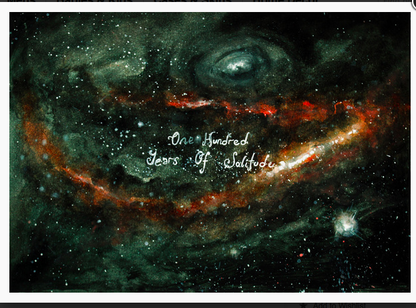 by Betul Donmez
by Betul Donmez Luis Alejandro Velasco was the "shipwrecked sailor" Garcia Marquez interviewed for El Espectador of Bogota. He survived a ten day ordeal at sea without food or water before landing at Categena. Their naval vessel was so overladen with contraband, it shifted badly in a swell, sending him and seven mates overboard. He landed on a raft with no provisions, while the other men drowned. Luis Rengifo, one mate barely close enough to catch hold, was caught in a wave. His specter appeared to Luis as he drifted on the raft.
The hallucinatory details of Velasco's story require a fuller telling than I can offer here. It includes his encounter with prescient sea gulls, the ghost of his mate, and towards the 10th day, his best friend Jaime Majarrés converses with him through the night. Do these visitations haunt the young sailor as testifies against corruption despite pressure from the military? This solitary tale is not unlike Gabriel Marquez' novels that depict magical appearances, heroes tormented by guilt, and a corrupt magical state.
According to Gabriele Marquez, his stories are not examples of magical realism. Consider them "fantastically accurate." Rushdie cautions us not to forget about magic in the service of truth (2014). The point Gabriel Marquez also makes in his Nobel Prize speech, "The Solitude of Latin America," is more about the blurry line between magic and truth. The distinction is a matter of perspective: what is the difference between a hallucination and a spectral visit? What are the politics of either? It is the West's insistence on maintaining this divide that drives Savransky to call ‘solitary’ the "entities whose epistemological and ontological status" remains ambivalent." (2012, 352)
Some time ago, on Facebook I posted this lovely quote from Savransky
Unlike the more familiar ‘politics of knowledge’ which, in its emphasis on epistemology and representation, ends up implicitly picturing knowledge-practices as more or less unjust representations of a common, fixed, stable, yet inaccessible, nature, thinking an ontopolitics of knowledge attempts to make present the extent to which the historical controversies between Western and non-Western knowledge-practices constitute a veritable politics of reality.
- who can be the subjects or agents of socially legitimate knowledge? what kinds of tests must beliefs pass in order to be legitimate knowledge? what kinds of things can be known?
- can historical truths or socially situated truths count as knowledge?
- what is the nature of objectivity?
- what is the appropriate relationship between the researcher and his or her research subject?
- must the researcher be disinterested, dispassioniate and socially invisible to the subject?
- can there be 'disinterested knowledge' in a society that is deeply stratified by gender, race and class.
If knowledge is historically situated, then our representations are also. By representation we mean a production of meaning through language. (Hall 1997) A radical reformulation of the "disinterested knowledge" requires the inclusion of what Foucault has called "subjugated knowledges," other ways of knowing, and the 'epistemic disobedience' towards those who, in the West, claim universal knowledge.
This has worked to open a space for non-human entities (spirits, ghosts, gods) speaking in the realm of knowledge. I've noted in the introduction to Invisible Aid, Dipesh Chakrabarty has argued for a space for gods spirits in the depiction of subaltern Indian history. But, as Savransky notes, the argument in post colonial theory is based primarily on representation. The problem of posing the existence of ghosts and gods is that there is no space in Western epistemologies, so the representational argument may not be adequate for different religious and cultural modes of being. Savransky thus takes these figures (mythological, ghostly, superhuman) to be postcolonial “solitary entities,” whose “solitude” is a result of their absence from Western epistemologies.
This shift from representation turns us to ontology, what anthropologists have called the "ontological turn." There is thus a collapse of symbolism, not separate from the object but "concepts and things are one and these same." (Henare, Holbraad, and Wastell 2007, 13 cited in Paleck and Risjord 2012) In this extended mind hypothesis considers a wider ambit for the the mind - beyond the brain and by extension to objects and bodily actions. Paleck and Risjord refer to using the abacus as the same as calculating in one's head.
Thus, they argue, objects create relationships, power and persons. We are to assess not what we think the objects are doing, but what they do.
Cited
Garcia Marquez, Gabriel, Story of a Shipwrecked Sailor, Translated by Randolph Hogan, Knopf, 1986
Hall, Stuart. Representation, meaning, and language. In S. Hall (Ed.), Representation. Cultural Representations and Signifying Practices, pp. 15–30. Thousand Oaks: Sage. 1997
Harding, Sandra Whose Science/ Whose Knowledge? Milton Keynes: Open University Press, 1991
____________, “Standpoint Theories: Productively Controversial”, Hypatia 24(4) 2009: 192-200.
Henare, Amiria, Martin Holbraad and Sari Wastell (eds). Thinking Through Things: Theorising Artefacts Ethnographically. London: Routledge, 2007
Palecek, Martin and Mark Risjord, Relativism and the Ontological Turn within Anthropology, Philosophy of the Social Sciences 2013 43: 3 originally published online 17 October 2012 DOI: 10.1177/0048393112463335
Martin Savransky (2012) Worlds in the making: social sciences and the ontopolitics of knowledge, Postcolonial Studies, 15:3, 351-368, DOI: 10.1080/13688790.2012.753572
Rushdie, Salman, Magic in the Service of Truth, Sunday Book Review, New York Times, April 21, 2014

 RSS Feed
RSS Feed
